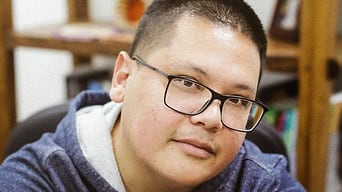“I want to sing like the birds sing, not worrying about who hears or what they think.” —Rumi
As a Chamorro climate activist and human rights lawyer in Guam, much of Julian Aguon’s work has been providing legal protection for Indigenous peoples. The Pulitzer-nominated writer believes they hold the key answers to many questions: How do we get out of the climate mess we’re in? How do we get to someplace better? How do we evoke enough empathy from the global community to do something?
One piece of the answer is Aguon’s definition-defying No Country for Eight-Spot Butterflies (Astra House, 128 pages, $23). It’s storytelling, it’s poetry, it’s memoir, it’s essay, it’s manifesto.
“The book is very queer in that way,” Aguon tells WW. “We as queer people are always sort of in the business of doing this thing where we have to define a category…but we refuse to be categorizable. And this book does that. It refuses to obey…and it’s sort of like a party, you know?”
Throughout the book (which features everything from picture-painting vignettes about Indigenous medicine women and racism and queerness to the passionate title essay about the U.S. military’s bludgeoning of Guam’s land), there is a sense of duty coupled with a sense of humor.
“Me, on my sixth birthday, when I lived in the village of Tamuning and the hula hoop was my jam,” says one photo’s caption, which features young Aguon blowing out his birthday candles.
Aguon keeps readers constantly pivoting. Following that sweet photo is a piece called “Fighting Words,” the commencement speech Aguon gave to the 2018 graduating class at the University of Guam. To deliver a speech that wasn’t full of the same ol’ The Future Is Yours rigmarole, he had to dig deeper.
In the speech, he explains: “I drew open the drawers of my own interior life and scanned their disheveled contents with an exacting eye. Memories and milestones and music albums.” That pretty much sums up Butterflies.
The collection’s stories are told by a person in varying stages of vulnerability, growth and understanding. They compose a poetic bildungsroman of an activist—and whether he’s writing about his aunt (a medicine woman) or ancestors who escaped a leper colony in Tumon, Aguon makes the political personal.
Not all of the stories in Butterflies are environmentally focused (though one could argue that everything connects to that theme).
Take “Nikki and Me,” the three-page vignette about a bus ride home from school. Mr. Q., a bus driver who “hated Chuukese people” tries to turn one student against the one Chuukese kid on the bus. The story concludes with a message: “But clearest of all is what I learned that day about what happens when we stand up for each other. We find our friends. And our way home.”
Then there’s the poem “Sherman Alexie Looked Me Dead in the Eye Once,” about a young and starstruck Aguon approaching Alexie at a reading in Spokane, Wash. After confessing he wants to be a writer, “Sherman smirks and says, kid, tell me something I don’t already know…I see it in your eyes, clear as day.” Unable to find enough of the right words after such a moment, 19-year-old Aguon leaves, “dragging my wordlessness with me, out into the busy street.”
When I first saw the poem’s title, I couldn’t help but bristle a little, now that Alexie’s name has been added to the list of icons accused of sexual misconduct. But Aguon’s awareness of (sensitivity to) the grief surrounding that topic is addressed in an honest and revealing footnote.
Aguon didn’t plan to include footnotes, but they became an integral part of the book. They serve as side conversations, allowing him to, as he says, “smuggle in an almost astonishing level of intimacy in the project.” He references Joni Mitchell’s 1979 Rolling Stone interview by Cameron Crowe, in which she refers to feeling “like a cellophane wrapper on a pack of cigarettes” when she created her famed breakup album Blue.
“That album was transparent. There was no hiding,” Aguon says. “So I wondered if I could possibly do that with a book. If I could write a book where there were no corners and no hiding.”
GO: Julian Aguon appears in conversation with Karen Russell at Powell’s City of Books, 1005 W Burnside St., 503-228-4651, powells.com. 7 pm Monday, Oct. 3. Free.
